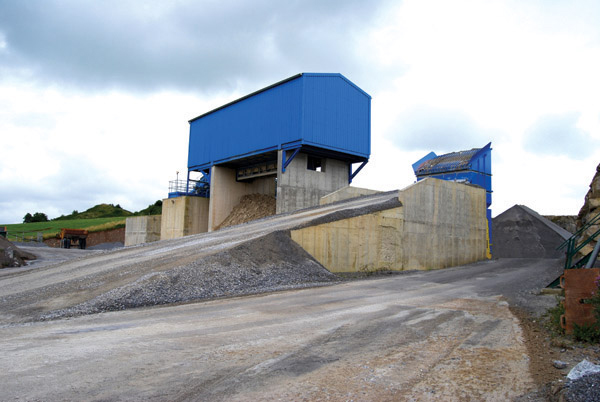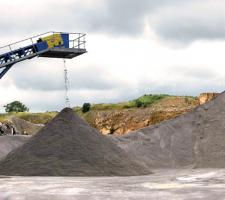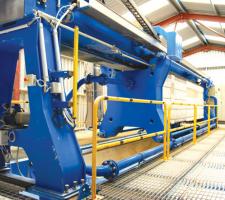
Balancing efficient processing of available resources with environmental issues is a challenge but it is one that quarry in Ireland has achieved through water treatment
Difficulties in gaining consent to open new quarries in Europe means that operators are now looking to process material that was once considered too 'difficult' to turn into saleable aggregates. Processing such materials usually calls for more aggressive screening and washing but the environmental impact of these added processes needs to be carefully balanced.
Ireland's Liam Lynch Quarries has managed to achieve the holy grail of processing what was previously considered waste without compromising its sustainability credentials. The limestone quarry in Croom, County Limerick is now processing dust and improving the quality of its other products through use of a new wash plant. But addition of a filter press to the system means that almost all the water used can be recycled.
The quarry opened in 1981 and still has around 25 years of reserves at the current levels of extraction and has a profitable market supplying a range of limestone aggregates to the local construction market. Nonetheless the site had built up a sizeable stockpile of dust of between 150,000 and 200,000tonnes because, at the time, there was no local market and the quarry could not process it into saleable material.
"We produce a range of crushed limestone products - 20mm, 14mm, 10mm, 804 drainage material and crushed 2" down," explained quarry manager Thomas Lynch. "But the 6 to 0mm material - the dust - could not be processed with our dry screening plant." Last year the quarry decided to install a new washing plant which would not only allow the dust to be processed for use in its own concrete plant but also for sale into the local market. And to ensure the new plant did not impact of the quarry's environmental performance, it opted for one with a water treatment system.
"Some quarries have to install water treatment to meet planning consent conditions," said Lynch. "This was not an issue for us but we could see that water treatment had both financial and environmental benefits - most of the water can be recycled, there are no lagoons requiring maintenance or presenting health and safety issues and also the filter cake from the treatment can be sold onto the landfill market as inert cover material." The company opted for a washing plant from Northern Ireland-based CDE with full water treatment provided by a GHT Overhead Beam filter press - the first of its kind in Ireland.
The plant was designed to allow Lynch to wash the 6 to 0mm quarry dust to produce concrete sand by removing the -63micron material. Much of this material can be used in the quarry's own ready mixed plant - lowering the cost of production by reducing the amount of material that needs to be bought in.
To maximise the benefit of the plant, it was also designed to allow Lynch to process some of the dirty overburden from the site. This is washed into clean 20mm, 10mm and sand again for use in the concrete.
The washing plant is fed via a hopper and inclined conveyor into a CDE R3M108 ProGrade triple deck rinsing screen measuring 1.8 by 6m, which separates the material.
The sand element is then passed into one of CDE's C-62 compact sand plants which has an integrated hydrocyclone for accurate removal of the -63 micron material without the loss of fines that can present an issue on conventional wheel and screw type plants. The material is then passed into a dewatering screen to dry the sand to a moisture content of 12%.
Used water and the -63 micron waste is transferred into an AquaCycle T08 high-rate thickener for treatment. The material is mixed with a small amount of flocculent prepared in the integrated Polyelectrolyte dosing station and passes into the thickener tank where it quickly begins to form a thick sludge and settles to the bottom.
The clean water overflows the top of the tank and is sent to a water storage tank for re-circulation around the system. Meanwhile a set of rakes rotate along the bottom of the tank moving the sludge into the centre and preventing it from setting. The rakes also send information about the amount of resistance back to the central PLC control panel which automatically starts and stops the main sludge pump when required. The thickened sludge is then sent to a buffer tank for further treatment by the GHT filter press.
The Overhead Beam Filter Press is a heavy duty machine specifically designed for the quarrying industry, which CDE claims can successfully eliminate the problems commonly associated with side-bar designs. The GHT is capable of 24hour unmanned operation and produces a dry, easily handled waste without use of any additional chemical or flocculent.
The CDE press installed at Liam Lynch's site is a GHT.1200.P6, containing 64 plates and operating at pressures of approximately 16tonnes per hour. The filter press is fed by a pump that takes the thickened sludge from the buffer tank and pumps it between the plates, which are then compressed under high pressure. The filter press is installed on two concrete walls and the dry filter cakes (of between 80-90% dry solid content) are discharged directly onto the ground. The clean water is recycled and piped back into the system, reducing the fresh water requirement to an absolute minimum.
According to Lynch, the plant uses around 1000gallons of water per hour to process up to 150 tonnes of aggregates but with the water treatment almost all the water can be reused.
Although the new plant is capable of processing the quarry's fine material, it is not currently being processed in the wash plant. "We did not have to process all of the stockpiles because we have since found a market for the material and we are using the plant to wash our other quarried products to improve their quality and value in the market," said Lynch. "A local road construction project has been using dust for lime stabilisation. But projects like that won't last forever and when the contract finishes, the wash plant and treatment works will give us access to other markets."















